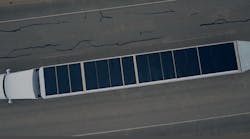It is important to remember that solar panel systems should not be expected to compensate for equipment specification errors or poor maintenance of wiring and connections. Solar panel sizing should be determined by the duty cycle that the trailer electrical system is likely to encounter. This can be evaluated by temporarily putting a data logging system on a trailer for a period of time to determine the true loads that the batteries will see during typical days.
Use the NREL PVWatts tool to evaluate the approximate expected output of a solar panel for your location compared to the system demands. Frequently the optimum solar panel size is significantly less than the total average power output the trailer needs. The rest of the power to operate the trailer and charge the batteries will come from the tractor or refrigeration unit alternator.
The main function of the solar panel is to maintain the trailer batteries at a higher average state of charge versus just charging with the tractor or refrigeration unit alternator. Savings of implementing solar panels are primarily associated with increasing battery life and reducing emergency roadside calls to jump or fix dead batteries.
Determining a return on investment for a solar panel system is a simple calculation looking at the potential savings in battery replacement costs and the value of having charged batteries vs. the total system installation costs.
The average trade cycle in most fleets for trailers is typically longer than that for tractors. Given this, the investment for solar panels can be spread over a larger number of years, making the business case more viable.
If the trailer only has a telematics system on it without additional equipment, then a solar panel to keep that battery charged is generally an excellent investment. On some newer systems, the telematics is not even hooked into the truck electrical system, so in these cases, a solar panel is required in order to keep the battery charged.
With trailers equipped with lift gates and other electrical equipment, the business case depends on potential savings versus the cost of implementing the solar system.
As with solar panels on tractors, those on trailers must be maintained once they are purchased. Managing trailer solar panels once purchased.
The financial case for solar on trailers needs to be reviewed in light of some facts
- Since there are two to three trailers for every tractor in most fleets, many trailers experience a significant amount of time when they are not hooked up to a tractor. As a result, any batteries installed on the trailer don’t always have a ready source of power for charging.
- The trailer power requirements need to be carefully evaluated to assure proper function during operation. This includes items like liftgates, refrigeration units, telematics, lighting, pallet jack charging, etc. Although each of these devices requires trailer-mounted batteries to operate, they all have different electrical current and charging demands.
- Frequently, these devices are combined on a given trailer, so all electrical demands need to be considered when choosing wiring configuration and battery capacities.




